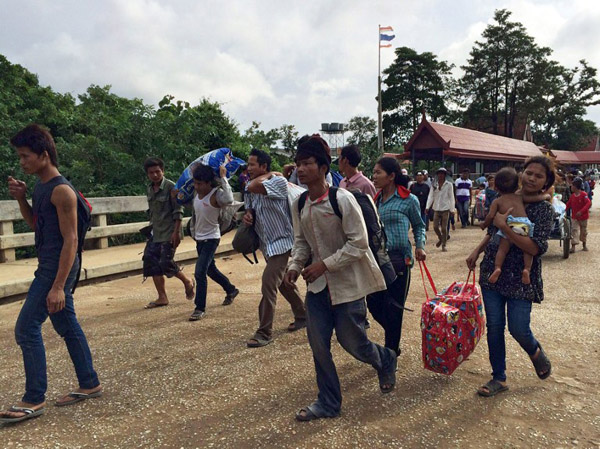Cambodian migrant workers walk across the Cambodian-Thai border in Cambodia’s western Battambang province on Sunday, June 15. Photo: AFP
More than 120,000 Cambodians have fled Thailand to return home in the past week, fearing a crackdown on migrant workers after last month’s military takeover, an official said on Sunday.
The mass exodus of labourers – who play a key role in Thai industries such as seafood and agriculture but often lack official work permits – comes amid a junta warning of arrest and deportation for illegal foreign workers.
“They’re returning en masse like a dam collapsing. They’ve never come en masse like this before in our history,” Kor Sam Saroeut, governor of the northwestern province of Banteay Meanchey where the main border crossing is located, told AFP by telephone.
Around 122,000 Cambodian migrants have returned from Thailand in the last week after being transported to the border by Thai military trucks or making their own way, he said late Sunday.
“They said they are scared of being arrested or shot if they run when Thai authorities check their houses,” Saroeut added. “Most of them went to work in Thailand without a work permit.”
Sirichan Ngathong, a spokeswoman for Thailand’s army which seized power in a coup on May 22, had said Wednesday the junta viewed illegal migrants as a “threat” and they faced arrest and deportation.
But two days later the Thai foreign ministry dismissed “rumours” the army was deporting Cambodian labourers and later Sunday released a new statement citing spokesman Sek Wannamethee as saying: “No crackdown order targeting Cambodian workers had been issued by the NCPO (junta body).”
As a result of the rumours, “Cambodian illegal workers have reported themselves to the Thai authorities for being repatriated voluntarily to Cambodia,” the statement said, adding that Thai immigration officials had provided transport for them.
More than 12,000 migrant workers crossed the border into Cambodia on Sunday alone, according to Saroeut, who expects many more to make the journey over the new few days.
Thousands were sheltering from the rain at local Buddhist temples and a market as they waited for transport to their home provinces.
Cambodian authorities have arranged nearly 300 cars and military trucks to ferry workers home from the Aranyaprathet-Poipet border checkpoint but many would have to stay near the site overnight until transport became available, Saroeut said.
At the smaller border checkpoint of Boeung Trakuon, south of Poipet, around 1,000 Cambodian men and women walked across the border with heavy bags and children in tow, said a local journalist.
Chea Thea, a 33-year-old construction worker, said she returned to Cambodia two days ago in a convoy of 20 cars organised by Thai authorities – deciding to leave after seeing her compatriots were departing in large numbers.
“Cambodian migrants are coming back. We feel scared,” she told AFP from her parents’ home in the northwestern province of Battambang.
“When the situation is better I may go back,” Thea said.
Soum Chankea, a coordinator for Cambodian rights group ADHOC who has met many workers at the border, said the number of returnees was growing each day.
“They keep coming, more and more. Thousands more have arrived in Poipet (border checkpoint) this morning,” he told AFP by telephone.
Six Cambodian workers and a Thai driver transporting them to the border province of Sa Kaeo died in an accident early Sunday, said Thai police official Sommart Meungmuti.
The accident, which left another 12 people injured, is suspected to have been caused by a bursting tyre, he added.
Thailand is usually home to more than two million migrant workers, according to activists, with many manual labourers coming from Cambodia, Laos and Myanmar.
In the past the authorities turned a blind eye to illegal labourers because they were needed when the economy was booming.
But now Thailand is on the verge of recession after the economy contracted 2.1 percent quarter-on-quarter in the first three months of 2014.
The coup followed years of political divisions between a military-backed royalist establishment and the family of fugitive former Thai prime minister Thaksin Shinawatra – a close ally of Cambodian premier Hun Sen, who once called him an “eternal friend.”
On Friday Cambodia’s opposition leader Sam Rainsy wrote to Thailand’s army chief Prayuth Chanocha calling for Cambodian migrants to be “treated in line with international human rights standards.”
His letter followed allegations from local rights organisations about the mistreatment of labourers by Thai authorities.




